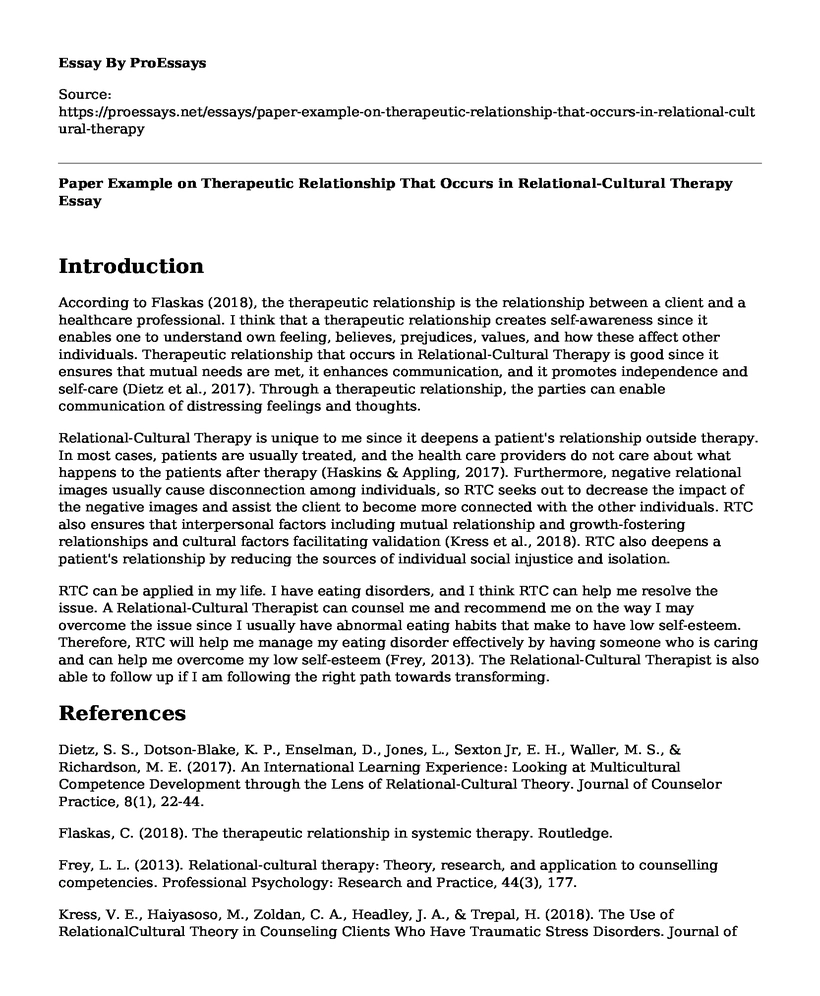Introduction
According to Flaskas (2018), the therapeutic relationship is the relationship between a client and a healthcare professional. I think that a therapeutic relationship creates self-awareness since it enables one to understand own feeling, believes, prejudices, values, and how these affect other individuals. Therapeutic relationship that occurs in Relational-Cultural Therapy is good since it ensures that mutual needs are met, it enhances communication, and it promotes independence and self-care (Dietz et al., 2017). Through a therapeutic relationship, the parties can enable communication of distressing feelings and thoughts.
Relational-Cultural Therapy is unique to me since it deepens a patient's relationship outside therapy. In most cases, patients are usually treated, and the health care providers do not care about what happens to the patients after therapy (Haskins & Appling, 2017). Furthermore, negative relational images usually cause disconnection among individuals, so RTC seeks out to decrease the impact of the negative images and assist the client to become more connected with the other individuals. RTC also ensures that interpersonal factors including mutual relationship and growth-fostering relationships and cultural factors facilitating validation (Kress et al., 2018). RTC also deepens a patient's relationship by reducing the sources of individual social injustice and isolation.
RTC can be applied in my life. I have eating disorders, and I think RTC can help me resolve the issue. A Relational-Cultural Therapist can counsel me and recommend me on the way I may overcome the issue since I usually have abnormal eating habits that make to have low self-esteem. Therefore, RTC will help me manage my eating disorder effectively by having someone who is caring and can help me overcome my low self-esteem (Frey, 2013). The Relational-Cultural Therapist is also able to follow up if I am following the right path towards transforming.
References
Dietz, S. S., Dotson-Blake, K. P., Enselman, D., Jones, L., Sexton Jr, E. H., Waller, M. S., & Richardson, M. E. (2017). An International Learning Experience: Looking at Multicultural Competence Development through the Lens of Relational-Cultural Theory. Journal of Counselor Practice, 8(1), 22-44.
Flaskas, C. (2018). The therapeutic relationship in systemic therapy. Routledge.
Frey, L. L. (2013). Relational-cultural therapy: Theory, research, and application to counselling competencies. Professional Psychology: Research and Practice, 44(3), 177.
Kress, V. E., Haiyasoso, M., Zoldan, C. A., Headley, J. A., & Trepal, H. (2018). The Use of RelationalCultural Theory in Counseling Clients Who Have Traumatic Stress Disorders. Journal of Counseling & Development, 96(1), 106-114.
Haskins, N. H., & Appling, B. (2017). RelationalCultural Theory and Reality Therapy: A Culturally Responsive Integrative Framework. Journal of Counseling & Development, 95(1), 87-99.
Cite this page
Paper Example on Therapeutic Relationship That Occurs in Relational-Cultural Therapy. (2022, Jul 18). Retrieved from https://proessays.net/essays/paper-example-on-therapeutic-relationship-that-occurs-in-relational-cultural-therapy
If you are the original author of this essay and no longer wish to have it published on the ProEssays website, please click below to request its removal:
- Female Suicide Bombers
- Articles Summary on Autism Spectrum Disorders
- Reflection Paper on Intimacy
- Essay Sample on Components of the Memory System: An In-Depth Analysis
- Essay Example on Nike Inc.'s Influential Organizational Culture: Shaping Employees' Behaviour
- Facebook Effects on Mental Health - Free Essay Sample
- Essay Sample on People's Addiction to Their Phones







